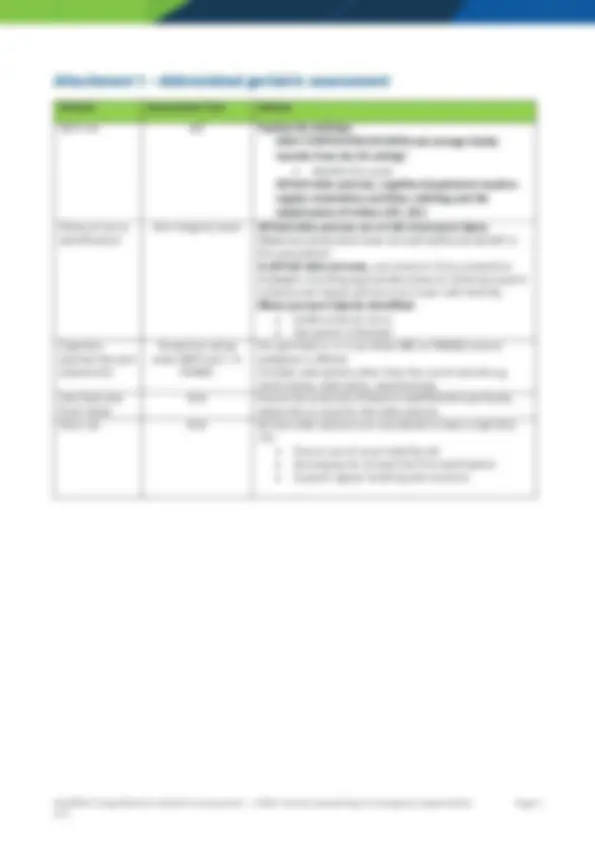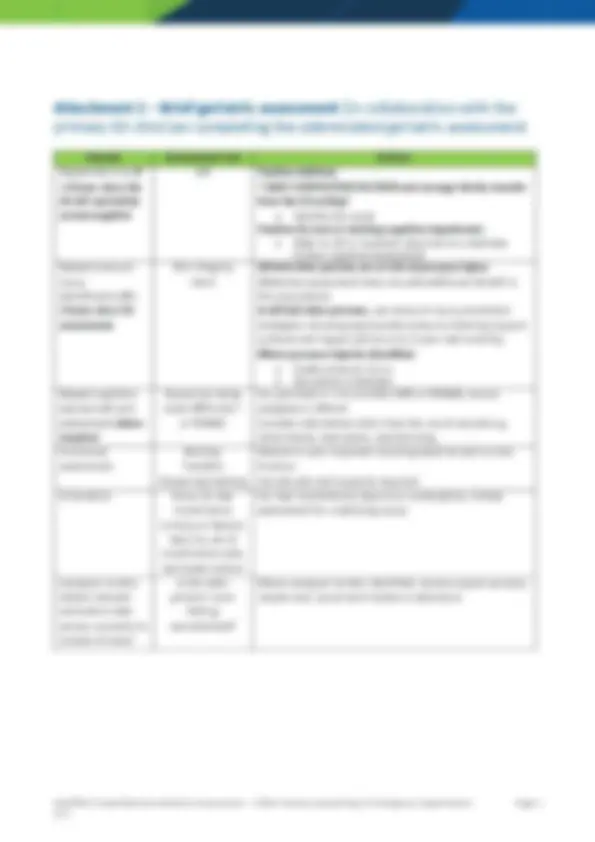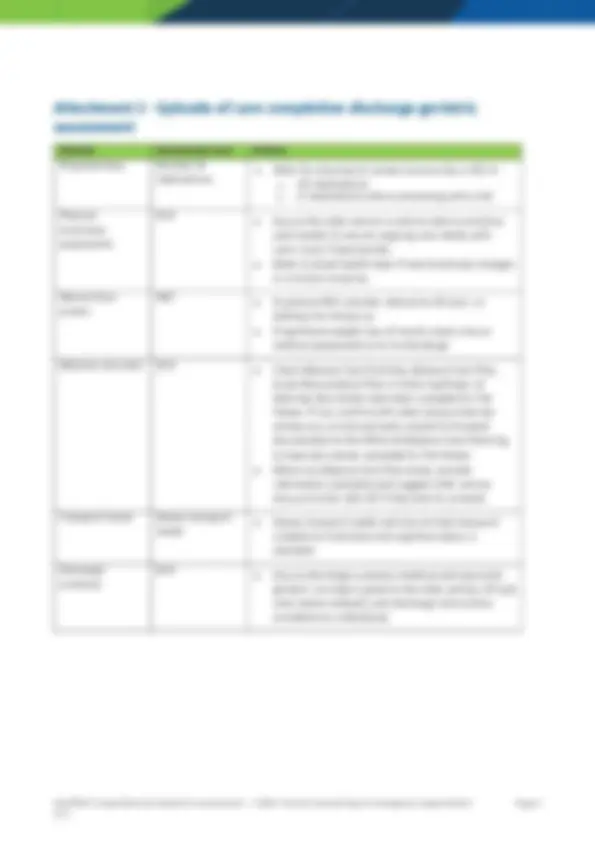Download Modified Comprehensive Geriatric Assessment and more Exams Geriatrics in PDF only on Docsity!
Modified Comprehensive Geriatric Assessment — Older Persons presenting to Emergency Departments Page 1
Multidisciplinary ED team members to complete with older persons
presenting to ED across the 24-hour spectrum
Modified Comprehensive Geriatric
Assessment
Older Persons presenting to Emergency Departments
CFS CFS 1-3* Usual care
CFS 4-9 or where clinician judgement suggests further assessment is required*:
Admission likely? Inclusion criteria for Clinical Frailty Scale (CFS): All older persons presenting to ED aged 75 years and over, or for Aboriginal and Torres Strait Islanders aged 55 years and over Primary ED clinician to complete the Abbreviated geriatric assessment and implement actions as required (attachment 1) , concurrent to medical assessment AND Refer to GEDI and/or RaSS where available *Note: all older persons should receive care consistent with the Australasian College for Emergency Medicine policy for care of older persons. It is important that, where no contra-indications exist, regular medications are administered in a timely manner. Particular focus should be applied to TIMELY administration of regular medications for those with Parkinson’s disease.
YES NO
Flag for patient flow unit to prioritise transfer to appropriate ward bed using CFS in handover Facilitate admission pathways where available eg geriatrics, fractured neck of femur Refer to specialist discharge support service Where no specialist discharge support service available or out of hours for GEDI/RaSS, complete the episode of care completion discharge geriatric assessment ( attachment 3)
Modified Comprehensive Geriatric Assessment — Older Persons presenting to Emergency Departments Page 2 GEDI ED GERIATRIC ASSESSMENT
Note: Assessment done concurrently while supporting multidisciplinary primary care staff
Inclusion criteria for GEDI: All older persons presenting to ED aged 75 years and over, or for Aboriginal and Torres Strait Islanders aged 55 years and over WITH A CFS 4-9 and or where clinician judgement suggests further assessment is required The GEDI will:
- Collect/access patient summary baseline information: a. Presentation information b. Medical history c. Medications list and management of medications (whether assistance is required to take medications or using webster pack) d. Patient goals of care e. Advance resuscitation plan or advance care plan availability f. Representation within 28 days g. Whether the patient is also a carer h. Community informal supports and / or formal approvals and adequacy of support
- AND complete the Brief geriatric assessment ( attachment 2) in collaboration with the primary ED clinician completing the Abbreviated geriatric assessment (attachment 1), concurrent to medical assessment. If Discharge is likely the GEDI completes the Episode of care completion discharge geriatric assessment (attachment 3).
Modified Comprehensive Geriatric Assessment — Older Persons presenting to Emergency Departments Page 4 Attachment 2 – Brief geriatric assessment (in collaboration with the primary ED clinician completing the abbreviated geriatric assessment Domain Assessment tool Actions Repeat Delirium **if
2 hours since the ED 4AT and initial screen negative** 4AT **Positive delirium:
- EARLY DISPOSITION DECISION and arrange timely transfer from the ED setting***
- Identify the cause Positive for new or existing cognitive impairment:
- Refer to GP or inpatient physician to undertake further cognitive assessment Repeat pressure injury identification if > 2 hours since ED assessment Skin integrity check All frail older persons are at risk of pressure injury (Waterlow assessment does not add additional benefit in this population) In all frail older persons, use pressure injury prevention strategies including appropriate pressure relieving support surfaces and regular q2hrly turns if poor bed mobility; Where pressure injuries identified:
- Grade pressure injury
- Document in Riskman Repeat cognition appropriate pain assessment where required Numerical rating scale (NRS) and / or PAINAD For pain that is >/=4 on either NRS or PAINAD, ensure analgesia is offered Consider alternatives other than the use of opioids e.g. nerve blocks, heat packs, repositioning. Functional assessment Mobility Transfers Showering/bathing Patient or carer reported including baseline and current function Include aids and supports required Elimination Focus on new incontinence (urinary or faecal); dysuria; use of incontinence aids; last bowel motion For new incontinence, dysuria or constipation, initiate assessment for underlying cause. Caregiver burden (where relevant and where older person consents to contact of carer) Is the older persons’ carer feeling overwhelmed? Where caregiver burden identified, review support services, respite care, social work review or admission
Modified Comprehensive Geriatric Assessment — Older Persons presenting to Emergency Departments Page 5 Attachment 3 - Episode of care completion discharge geriatric assessment Domain Assessment tool Actions Polypharmacy Number of medications
- Refer for pharmacist review (community or ED) if: o >10 medications o >5 medications where presenting with a fall Physical functional assessment
N/A
- Ensure the older person is able to able to mobilise and transfer to ensure ongoing care needs, with carer input if appropriate.
- Refer to allied health team if new functional changes or clinician concerns. Malnutrition screen MST (^) • If positive MST consider referral to GP and / or dietitian for follow-up
- If significant weight loss of recent onset, ensure medical assessment prior to discharge Advance care plan N/A (^) • Check Advance Care Directive, Advance Care Plan, Acute Resuscitation Plan or Enduring Power of Attorney documents have been uploaded to The Viewer. If not, confirm with older person that the wishes are current and seek consent to forward document(s) to the Office of Advance Care Planning, to have documents uploaded to The Viewer.
- Where no Advance Care Plan exists, provide information pamphlet and suggest older person discuss further with GP if they wish to proceed. Transport home Assess transport needs
- Assess transport needs and ensure that transport suitable to functional and cognitive status is available Discharge summary N/A (^) • Ensure discharge summary (medical and specialist geriatric nursing) is given to the older person, GP and carer where relevant, and discharge instructions provided are understood.














